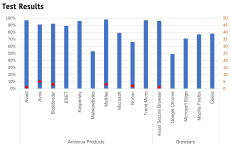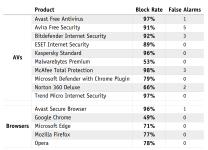Gandalf_The_Grey
Level 76
Thread author
Verified
Honorary Member
Top Poster
Content Creator
Well-known
- Apr 24, 2016
- 6,585
Introduction
This test evaluates the phishing-page detection rates and false positive rates at time of testing (February 2023) of various AV products, and different browsers, as listed below. AV-Comparatives selected the products to be tested. We purchased these in January 2023. This comparative test was commissioned by Gen Digital. The testing dates were chosen by the testing lab and not pre-disclosed.
Tested products
The test took place from 1st February till 19th February 2023. The following up-to-date products were tested in parallel, and with active Internet/cloud-access, on Windows 10. Phishing protection provided by AV products were tested using Google Chrome (with Google SafeBrowsing disabled). The browser extensions of the AV products were installed and enabled. The different browsers were tested without an AV program running.
Antivirus (AV) Products:
• Avast Free Antivirus 22.12 – 23.1
• Avira Free Security 1.1
• Bitdefender Internet Security 26.0
• ESET Internet Security 16.0
• Kaspersky Standard 21.8
• Malwarebytes Premium 4.5
• McAfee Total Protection 16.0
• Microsoft Defender 4.18 with Defender browser plugin for Chrome
• Norton 360 Deluxe 22.23
• Trend Micro Internet Security 17.7
Browsers:
• Avast Secure Browser 109.0 – 110.0
• Google Chrome 109.0 – 110.0 with SafeBrowsing
• Microsoft Edge 109.0 – 110.0
• Mozilla Firefox 109.0 – 110.0
• Opera 95.0
Anti-Phishing Test-Set
For this first test, we used 250 valid phishing URLs. The number of used clean URLs for false alarm detection was 250.
PDF:




